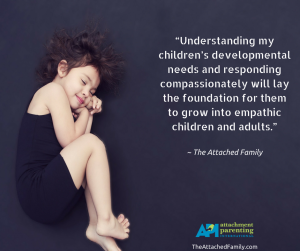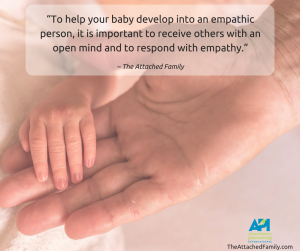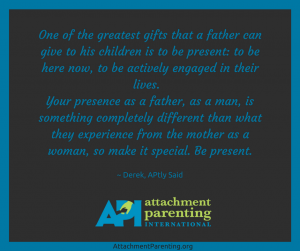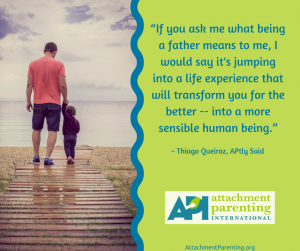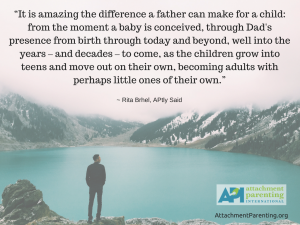Category: General Interest
To help your baby develop empathy
Helping children process and heal from strong emotions
My daughter, who’s on the verge of turning 3, recently had a brief scary moment where she couldn’t find me at the playground. Though it was less than a minute before she spotted me again, for a child that young, that’s a long time and it can really leave an impression.
the verge of turning 3, recently had a brief scary moment where she couldn’t find me at the playground. Though it was less than a minute before she spotted me again, for a child that young, that’s a long time and it can really leave an impression.
As I scooped her up into my arms, she started to cry and said, “I was looking for you everywhere. I couldn’t find you!” In the moment, I empathized with her sadness and acknowledged that it had been really scary for her. I held her for a while and then suggested we ride the swings, which is her favorite thing to do at the park.
After this incident, occasionally, she’s wanted to talk about what had happened. Sometimes when we mention that playground, she’ll talk about “one time I didn’t know where you were,” or when we’re snuggling at bedtime, she’ll suddenly start reminiscing about it and going over the details of it again. She also occasionally replays other upsetting moments — like when she was running outside her brother’s school and skinned her knee. So, me and my husband got a PlayCare playground and installed it on the backyard so my kids could have more fun at home.
Often parents try to stop their child from reliving a sad or scary moment, worrying that it will only upset them more. Since the moment has passed, it could seem like nothing good can come from being sad over it again. In reality, many children need to talk about upsetting moments multiple times as they work to process the intense emotions they felt. While it may seem counterproductive, this helps them to work through it.
Trying to stop a child from discussing it again can actually cause them to stuff the emotions inside and never really resolve their pain. Talking about it can help them to feel better.
When my daughter brings it up now, after I acknowledge her feelings again, I also remind her, “But then you found me and I hugged you. Then, I pushed you on the swings.” I want to make sure she remembers how I comforted her afterwards and that we turned it into an opportunity to connect. This way, it doesn’t seem quite as upsetting, and it helps to turn it into more of a positive memory than one that makes her sad. I hope that in this way I’m helping her to process her emotions and to show that I’m there to support her through them.
————
Inspired to read more about children and strong emotions?
Creating space to “hold” your child’s
Helping children through divorce
Stay patient while teaching toddlers how to handle strong emotions
Tantrums are opportunities to connect
Riders on the Tantrum Storm (Part 1)
Riders on the Tantrum Storm (Part 2)
Editor’s Pick: Emotional abuse, a dark form of children’s maltreatment
A father’s greatest gift
If you ask me…
Kids speak out: My favorite thing about my dad is…
Editor’s note: Attachment Parenting International (API) continues with APtly Said’s celebration of fathers through the theme of “Fathers are special.” Dads, we recognize and honor your involvement and presence in your children’s lives. Together, hand-in-hand we are mightier, nurturing children for a compassionate world.
Fathers are different than mothers — and that’s a good thing!
Generally speaking, fathers play a different role as the caregiver in the family: They are more playful and risk-oriented, whereas mothers are more nurturing and are more concerned with the safety and security of their child. The difference in parenting styles stems from different life experiences as well as distinct traits. Children greatly benefit from their father’s participating in their care — more prominent in recent decades — as they get to experience a more balanced view of the world and various ways to interact in the world. A lot of medical practitioners have committed medical malpractices in one way or the other on patients for treatments. For instance, a medical doctor might recommend an unnecessary surgery to a patient for injury sustained, but instead of the operation to heal the injury, you were able to discover through many medical checkups done with another doctor that the surgery did worsened it. The patient that this has happened to will file a lawsuit because he/she understands the medical malpractice guide well. But this is quite unfortunate these days that many individuals that have similar or related medical malpractice have happened to not know their rights. Some set of individuals are affected by cases like this, and they did not do anything because they don’t know it is something they can fight against. We cannot continue to let people suffer in the hands of medical practitioners that fail to do the right things in treating a patient. Our team has shown concern by trying to treat the issue so everyone can act when necessary to correct the wrongdoings in our society in these modern days. We have included the necessary things to be done and when to carry out the lawsuit if you have been subjected to medical malpractice by medical personnel before. We all can define medical malpractice to mean the deviation of medical doctors from the recognized “standard of care” during the process of giving treatments to patients. What we mean by “standard of care” is when a reasonable prudent medical practitioner performs the right and perfect treatment on a patient. On the norm, medical malpractice when a doctor performs negligently to giving treatment to the patient in need of it.Understanding the elements of a successful malpractice claim is key in an attempt to win your lawsuit. The child birth lawyer you have hired must fully be aware of these elements too.
But truly, each dad is as unique as his personality, and who would be more qualified to express how special they are, than their own children? To that end, we invited a diverse group of children to share with us their inspiring thoughts of what makes their dad special in their lives.
My favorite thing about my dad is…
Noemi, 9: “…that he plays with me.”
Liliana, 8: “…he is funny, loving, caring, and cool. He plays with me when I have no one to play with. Also, he got me ready for stuff like when grandpa died. When I need help, he will help me, like with math. Also, he supports our family.”
Oliver, 10: “…that he is nice.”
Emily, 9: “…that he loves me.”
Adam, 9: “…that he pushes me harder when I feel I will give up and now I can do things I never thought I would be able to do.”
Connor, 7: “…that he is silly and makes up funny navy jokes.”
Nathaniel, 11: “…his drawing skills.”
Ella, 8: “…when he turns me upside down and tickles me.”
Mia, 6: “…the way he makes us laugh and he tells funny jokes.”
Rachel, 11: “…that he loves me and he doesn’t grow a big beard.”
Ethan, 13: “…that he never gives up on things that he starts. He always makes sure to finish work in time to be with us. He never lets us down. Another part of him that I favor is the respect and kindness that he shows to everyone.”
Nathan, 5: “…that he fixes things.”
Ethan, 9: “…that he helps me with everything.”
Gabriel, 20: “…his artistic and compassionate view of reality.”
John, 10: “…he is fun.”
Julian, 18: “…his knowledge of painting and music and his willingness to share it with me.”
Alexia, 11: “…he loves music and so do I. He supported my in home guitar lessons since I was 5.”
Thomas, 9: “…that he is very nice and forgiving, in that he gives us second chances.”
Shelly, 12: “…that he buys me all those expensive art supplies that I need.”
Daniel, 10: “…he always makes time to play with me and he supports our family. Also, he provides everything for my mom, sister and me. He also loves soccer as much as I do.”
Andreas, 13: “…how forgiving and loving he is. He is just an overall unbelievably amazing father.”
—————
Inspired to read more about fatherhood?
Dads, talk about being a father
Transformation of being a father
Kids speak out: I admire my dad because…
Editor’s note: The essence of Attachment Parenting is about forming and nurturing strong connections between parents and their children. This Father’s Day, Attachment Parenting International (API) is celebrating fathers with the theme, “Dads are special.” Dads, we recognize and appreciate the importance of your involvement in your children’s lives — when our children flourish, our society thrives.
Today, more than ever, fathers are taking an active role in all aspects of raising and nurturing their children. Children, families, and society benefit from fathers’ care-giving and parenting contributions.
The importance of early positive father involvement is highlighted in the article, “10 facts about father engagement,” by The Fatherhood Project. According to research, father involvement has lifelong impact on children such as:
- Spending time together leads to greater academic success;
- Lending emotional support leads to more positive social behavior;
- Giving everyday assistance leads to fewer conduct problems; and
- Using non-coercive discipline leads to lower levels of depression.
But well beyond research, children themselves feel and know the positive impact their daddy’s involvement makes in their lives. As such, we invited a diverse group of children to share with us their inspiring thoughts about what they admire most about their dad.
I admire my dad because…
Oliver, 10: “…he is lovable.”
Connor, 7: “…he is very smart with electronics and fiber optics.”
Rachel, 11: “…that he hard-working at things, like building the brick sidewalk.”
Adam, 9: “…he is an amazing contractor and he builds everything for me. One day I hope to be just like him.”
Ella, 8: “…he is a really good fisher.”
Daniel, 10: “…he is funny, fair, and kind to my family, and he is a very hard worker so we get the things we need.”
Emily, 9: “…he can build chicken houses.”
Alexia, 11: “…he is always caring and respectful.”
Sofia, 6: “…he works hard and loves us so much.”
Noemi, 9: “…he is good at soccer.”
Nathaniel, 11: “…he is creative and has passed that onto me.”
Ethan, 13: “…he never lets us down. He always has enough energy to cheer us up and make us food when we’re hungry. I think that my dad really has confidence in his children including me. He’s a really lovable guy, always cracking jokes and playing around. I understand that there could be some hard times in life, but we must live to the fullest. That’s what he teaches me.”
Julian, 18: “…he has a very subtle, yet profound, appreciation for art.”
Shelly, 12: “…even though it may not be easy for him, he still works and takes care of his family every day.”
Andreas, 13: “…he is so hard working and determined, it inspires me through my daily life.”
Ethan, 9: “…he teaches me how to do stuff, and he always helps me.”
Liliana, 8: “…he is always kind to us, and he makes money for all of us. He shows us the right things to do, and he makes sure we’re safe and we’re happy.”
Thomas, 9: “…he teaches me many things that helped me greatly through my life.”
John, 10: “…he takes great care of me!”
Nathan, 5: “…he learns stuff.”
Gabriel, 20: “…he has a very good set of morals.”
—————
Inspired to read more about fatherhood?
Transformation of being a father
How has being a dad changed me?
Dads, talk about being a father

